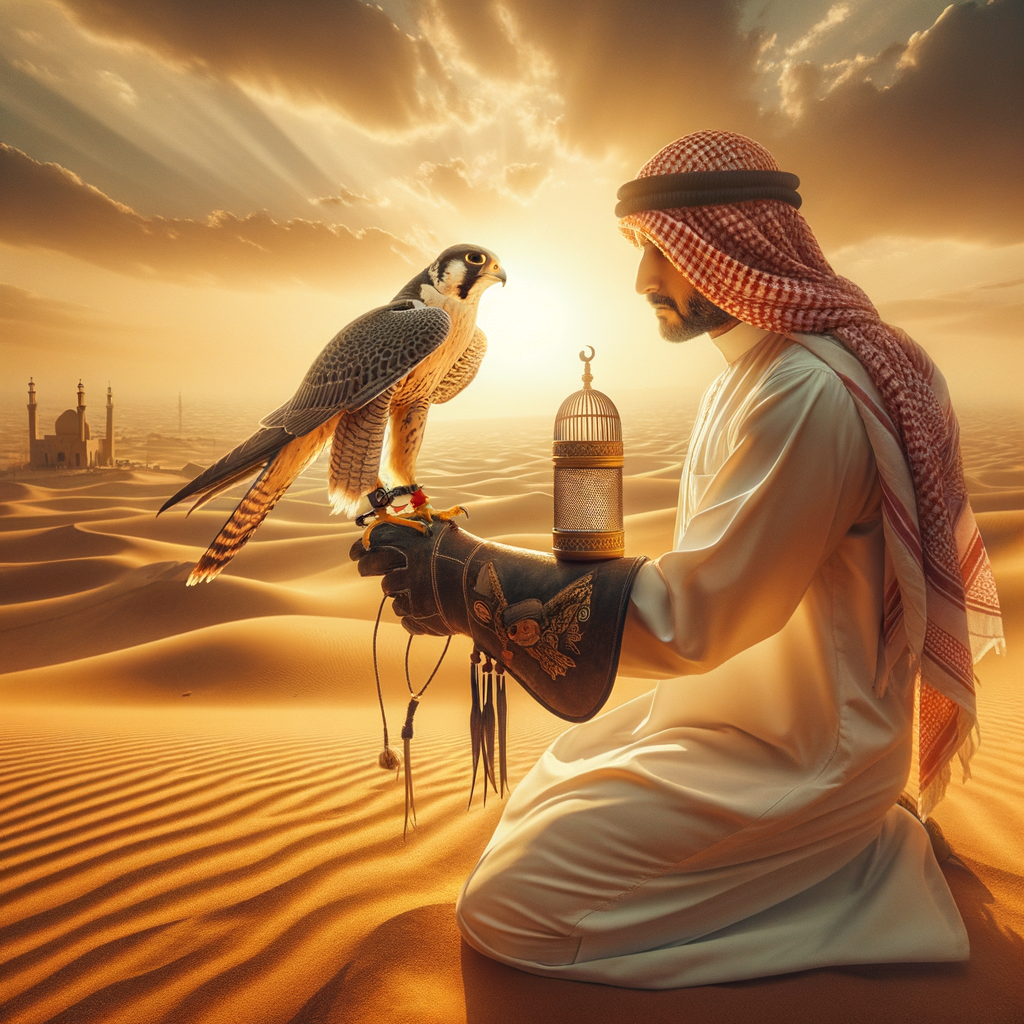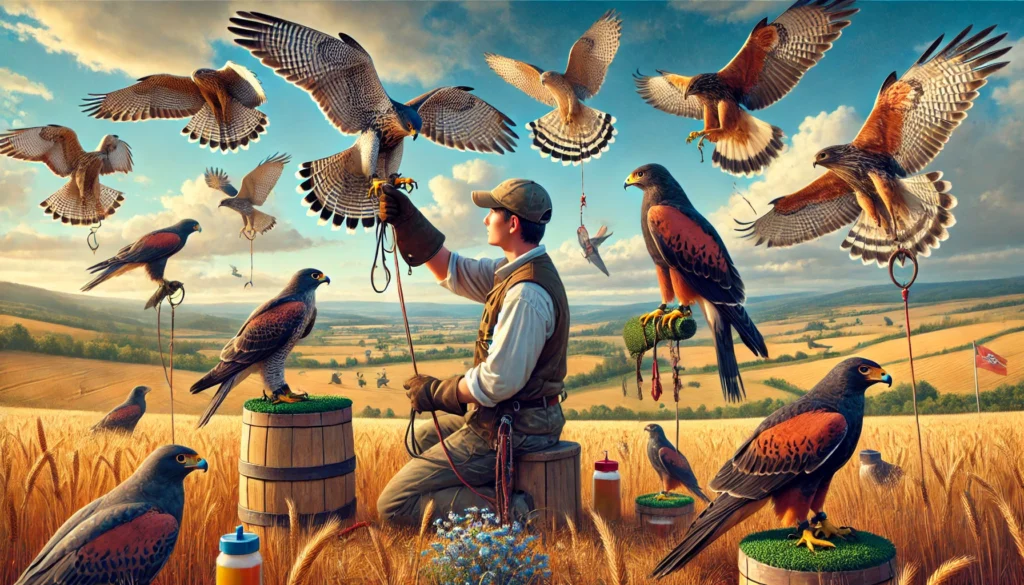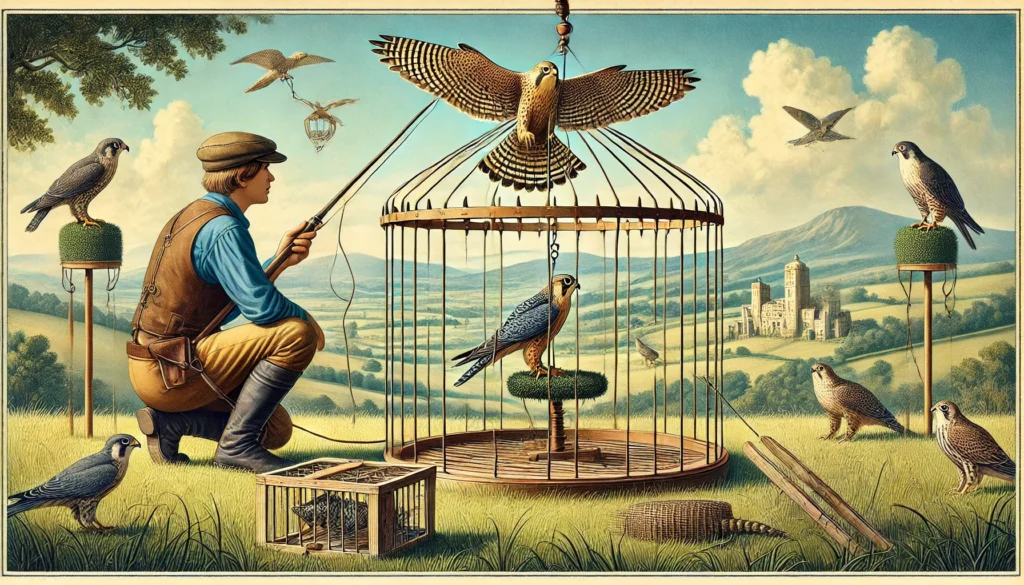Exploring the Significance of Falconry in Arabic Culture
- Falconry is a traditional practice with deep roots in Arabic culture.
- It involves training and hunting with falcons.
- Falconry has been practiced for thousands of years in the Arabic world.
- Falcons are highly valued and often symbolize courage and nobility.
- This practice is passed down from generation to generation.
- Falconers develop a special bond with their birds.
- Falconry is not just a hobby; it’s an important cultural heritage.
- Festivals and competitions are held to celebrate falconry skills.
- Falcons are trained to hunt prey such as hares and birds.
- The Arabic community sees falconry as an art form that requires patience and skill.
- It teaches respect for nature and the animals involved.
Experience the ancient and noble tradition of falconry with Learn Falconry!
Discovering Falconry in Arabic Culture: An Ancient Bond Soars High
Imagine wandering through the misty hills of Ireland, where people have passed down their love for storytelling from generation to generation, cherishing the bond between themselves, their heritage, and the land. Now, picture a similar tradition, not in the green Irish countryside, but in the vast, sun-soaked deserts and bustling cities of the Arabic world. Here, falconry isn’t just a hobby; it’s a way of life, steeped in history and majestic beauty.
But why should you keep reading? Because understanding the significance of falconry in Arabic culture is like uncovering the pages of a thousand-year-old book. Every falcon’s flight tells a story of human companionship, resilience, and respect for nature. As we explore the symbolism, the legends, and the modern-day practices of falconry, you’ll see why this age-old tradition continues to soar high in the hearts of many.
So, fasten your seatbelts; we’re about to dive into a world where the bond between humans and falcons takes you on an exhilarating flight across time and ancient sands. Whether you’re fascinated by cultural heritage, passionate about wildlife, or simply love a good story, this article promises to be an adventure you won’t want to miss!
The Cultural Significance of Falconry in the Middle East
Arabic falconry, also known as Middle Eastern falconry, is a tradition that has been passed down through generations and holds a special place in the cultural landscape of the region. The art of falconry, which involves training birds of prey to hunt in cooperation with humans, has been practiced for thousands of years. This practice is deeply intertwined with the history and traditions of Arabic-speaking countries.
The Roots of Arabic Falconry
Falconry in the Middle East is more than just a sport; it is a cultural heritage that dates back to ancient times. Historically, Bedouin tribes in the Arabian Peninsula relied on falcons for hunting. These birds were essential for hunting game, which provided food and resources in the harsh desert environment. The Bedouins’ survival depended on their skill in training falcons, and this practice quickly became a revered tradition.
Symbolism and Status
In Middle Eastern falconry, falcons are not only valued for their hunting abilities but also for their symbolic status. Falcons represent a blend of power, beauty, and grace, characteristics that are highly esteemed in Arabic culture. The possession and training of a falcon are often seen as symbols of nobility and status. Over time, falconry evolved into a pursuit of the elite, with wealthy families and royal figures dedicating their resources to maintaining this tradition.
Explore more about the History of Falconry
Traditional Techniques and Equipment
The practice of Arab falconry involves various traditional techniques and specialized equipment. For instance, falconers use hoods to cover the birds’ heads, keeping them calm before they are released for hunting. Jesses and leashes are used to manage the falcons during training and hunting sessions. Perches and stands provide safe places for the birds to rest.
Given the importance of these tools, modern falconers continue to use and refine traditional equipment. This balance of ancient practice with modern advancements ensures that the art of falconry remains both respectful of tradition and effective in practice.
Learn more about Falconry Equipment
Training and Techniques
Training a falcon is a meticulous process that requires patience, consistency, and a deep understanding of the bird’s behavior. Middle Eastern falconry often employs specific methods that have been honed over centuries. These techniques include “manning” (getting the bird accustomed to human presence), “lure flying” (using a lure to simulate prey during training), and “creance training” (using a long line to control the bird during its initial free flights).
Each technique is designed to build trust and cooperation between the falconer and the bird, culminating in a harmonious partnership that is crucial for successful hunting.
Discover more about Training a Falcon
Conservation Efforts
Modern falconry in the Middle East also plays a significant role in conservation. Falconers are deeply aware of the importance of maintaining healthy bird populations and their habitats. Efforts such as breeding programs, habitat restoration, and legal frameworks are in place to ensure that falcons thrive both in the wild and in captivity. These conservation practices not only help preserve the species but also support the continuation of falconry as a sustainable tradition.
Read about Falconry and Conservation
Today’s Practice
Today, the tradition of falconry in the Middle East is kept alive through both competitions and education. Falconry festivals and events bring enthusiasts together to demonstrate their skills, celebrate their heritage, and share knowledge. These gatherings help to educate younger generations about the importance of their cultural heritage and the need to continue these practices responsibly.
Find out about Falconry Competitions
Whether it’s maintaining ancient traditions or adopting new techniques, Arabic falconry remains a vibrant and integral part of life in the Middle East. The continued respect and reverence for these practices showcase the unique blend of history, culture, and nature that defines Arab falconry traditions.
For further reading on the rich history and evolution of falconry, please visit:
Falconry in Arabic Culture: A Timeless Tradition
Falconry Festivals and Competitions
Falconry festivals are vibrant, exciting events that showcase the skill and tradition of falconry in Arabic culture. Here are some of the major festivals:
- AlUla Falcon Cup: Held in Saudi Arabia’s Al-Mughira Village, this event brings together falconers from across the globe.
- Qatar International Falcons and Hunting Festival (Marmi 2024): Registration opens on December 24, 2023, and the event features various competitions.
- Abu Dhabi Falconers Club Events: This club hosts multiple competitions throughout the year, including the Alyasat Falcons Competition and the President’s Cup Falcons Beauty Contest.
Cultural Significance
Falconry holds a special place in Arabic culture. This ancient practice, known as the “Sport of Kings,” is more than just a hobby:
- Symbolic Values: It represents patience, skill, and a deep connection with nature.
- Preservation of Heritage: Falconry is viewed as an essential part of Arab folk heritage, one that must be passed down to younger generations.
Conservation Efforts
Conservation plays a vital role in maintaining the health and population of falcons:
- Abu Dhabi Falcon Hospital (ADFH): Since its opening in 1999, the ADFH has treated over 50,000 falcons.
- Rehabilitation Centers: For example, the Royal Society for the Conservation of Nature (RSCN) in Jordan runs a raptor rehabilitation center.
- Middle East Falconry Archive (MEFA): A digital repository focused on safeguarding the heritage of Arab falconry literature.
Falcon Population Trends and Trafficking Issues
Understanding falcon population trends and combating illegal trafficking are crucial for the sustainability of this tradition:
| Falcon Species | Conservation Status | Challenges |
|---|---|---|
| Saker Falcon | Endangered | Electrocution, unsustainable capture, habitat degradation |
| Peregrine Falcon | Least Concern | Illegal trafficking |
- Falcon Trafficking: Driven by conflict and poverty, illegal trafficking is a major issue. High-value birds can sell for tens of thousands of dollars.
Economic Impact
Falconry is not just a cultural practice but also a thriving business:
- Market Value: Falcons can be sold for prices ranging from around $4,000 to an astonishing $250,000.
- Economic Contributions: Major falconry events and festivals contribute substantially to the local and regional economies.
International Participation
Falconry festivals attract participants from around the world, fostering cross-cultural appreciation for this ancient practice:
- Global Competitors: Events such as the Abu Dhabi Falconry Competition see participants from a wide array of countries.
- Cultural Exchange: These gatherings promote mutual respect and understanding of falconry traditions globally.
Falconry in Modern Literature
Efforts to document and digitize falconry literature ensure that this valuable knowledge can be accessed by future generations:
- Text Preservation: Over 70 historical manuscripts on falconry, written between the 8th and 16th centuries, are now digitally archived.
Celebrating the Rich Heritage of Falconry in Arabic Culture
Falconry is more than just a sport in Arab culture; it’s a cherished tradition that dates back over four thousand years, symbolizing patience, skill, and a deep connection with nature. Today, it continues to thrive through vibrant festivals and competitions in places like AlUla, Abu Dhabi, and Qatar, drawing participants from around the globe.
Efforts to preserve this age-old tradition are robust. Digital repositories like the Middle East Falconry Archive (MEFA) ensure that priceless manuscripts are safeguarded for future generations. Meanwhile, institutions like the Abu Dhabi Falcon Hospital and the Royal Society for the Conservation of Nature work tirelessly to protect falcon populations and combat trafficking.
These endeavors not only honor the falcons but also celebrate the values and cultural significance attached to falconry. As we look to the future, it’s essential to continue these preservation efforts and sustain the rich heritage of Arab falconry, ensuring that this ancient practice remains a living tradition for generations to come.
At Learn Falconry, we are passionate about sharing and preserving this remarkable cultural heritage. Whether you’re an enthusiast or a curious learner, join us in celebrating the majestic art of falconry and its invaluable contribution to our shared human culture.



